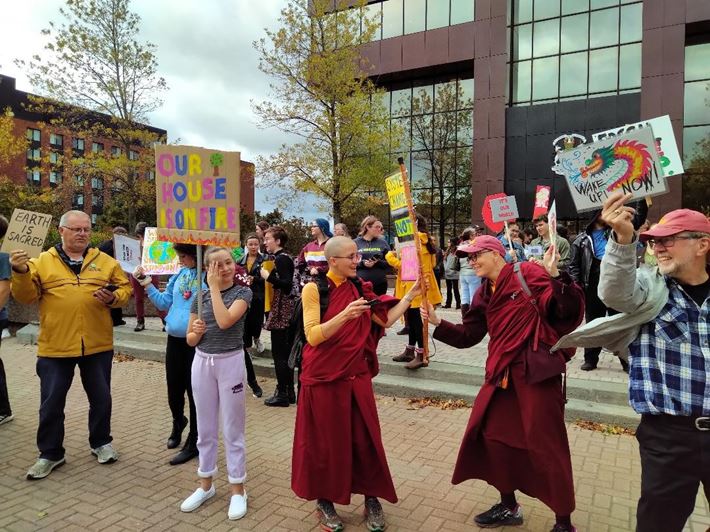Quite by accident, this fall’s municipal election will be the most environmentally friendly election in CBRM’s history. Because of the ongoing pandemic, all ballots will be delivered by mail or online. That means less signage and paper at ballot sites, and fewer vehicle emissions, since voters don’t need to drive. It’s ironic, since this election may unseat a council whose environmental record is underwhelming at best.
Mayor Clarke and his Council, with only a couple of exceptions, seem oblivious both to the threat posed by climate change—economic disruption and human costs equal to at least 100 pandemics—and to their constituents’ demands that they address the crisis. Instead, they treat the issue like a joke, the butt of which are CBRM’s citizens.
The Set-Up: In November 2018, the Council passes a “Blue Dot” resolution. Inspired by the Suzuki Foundation, this resolution frames a healthy environment as a basic human right: fresh air, clean water, and healthy food. It also guarantees citizens’ rights to access nature and to participate in government decisions that affect the environment.
The Punchline: In 2019, Council reveals plans to decimate the Baille Ard Forest, a precious ecosystem which supports citizens’ health in numerous ways, from the documented mental health benefits of the trails to the natural flood mitigation of old-growth trees. They adjusted their plans only after months of public outcry.
Here’s another knee-slapper: Thanks to the efforts of Councillor Amanda McDougall, CBRM declares a state of climate emergency in May 2019, one month ahead of the federal government. Mayor Clarke supports the vote, but only after clarifying, on the record, that the declaration carries no legal weight. Ours is a government that ratifies environmental legislation—only so long as they don’t actually need to act on it.
Their obstacle may not be indifference so much as ignorance. At a January 2020 public hearing on environmental issues (which likely wouldn’t have happened without pressure from our local Extinction Rebellion group), Deputy Mayor Ivan Doncaster repeatedly asked experts, “What, in your opinion, is climate change?” That would be a fine question to ask—thirty years ago. In 2020, there is a worldwide consensus among climate scientists.
Man-made climate change is not a matter of opinion; it’s a fact whose effects are felt daily, around the world. And while Council congratulates themselves for using low-energy light bulbs in their offices, CBRM’s coal-fueled infrastructure adds to an average global temperature increase of 0.18oC per decade. The causes are systemic, and can only be solved by decisive action at all levels of government.
In this election cycle, as usual, the key issues are likely to be health care and the economy. And, fair enough; in the midst of a global pandemic, everyone has questions about public health and job security. Bizarrely, Clarke and Council have not made the obvious connections between these issues and the environment. The fact is, nothing threatens public health more than climate collapse… and nothing would revitalize our economy than a green revolution.
The most pressing effects of poor climate management on public health involve airborne and waterborne pollutants. When Ontario phased out coal power starting in 2003, they produced an estimated $3 billion in annual health benefits by reducing chronic heart and lung disease caused by air pollution.
But there are more insidious health costs that come with global heating. Changes in climate can increase the amount of water- and food-borne diseases, as well as diseases transmitted by insects (we are already seeing this in tick-transmitted Lyme disease, cases of which increased by 300% over the last decade). And then there are the injuries and fatalities brought on by extreme weather events—mostly hurricanes and flooding in Cape Breton’s case—as well as by record-setting heatwaves.
Lives and money can be saved by investing in renewable energy and by promoting greener lifestyle choices among CBRM residents. But Capers think about money primarily in terms of jobs. In this arena, environmental adaptation also pays off, in ways Council can’t seem to understand. The so-called “green economy,” which promotes clean energy, energy efficiency, and eco-friendly community design, has consistently been ranked as one of Canada’s fastest-growing industries over the past decade. Why is CBRM not on the gravy train?
Rather than vainly courting foreign investors, imagine a Council who offered incentives and tax breaks for local, environmentally-friendly businesses and farms. Instead of increasing cruise ship tourism (each ship emits the same amount of greenhouse gas as 1 million cars), picture a CBRM that promotes sustainable tourism through camping, carbon-neutral hotels, bike rentals, and more. Studies show that green destinations get higher ratings from tourists, and that sustainable visitors spend more while traveling.
These economic tactics may not compute for our current councilmembers, but I believe they resonate with Capers, most of whom dearly love their island’s natural assets and value homegrown initiatives. Self-resilience is a source of pride; it should come as no surprise that greener, more sustainable communities report higher quality of life.
Environmental advocates, myself included, have been arguing these points for years, but our current administration remains unyielding. If ignorance is not to blame, the chief cause may be partisan politics (lest we forget, Mayor Clarke ran for the provincial PC leadership in 2018, while still receiving CBRM paycheques). But climate should not—must not—be a partisan issue. Like coronavirus, climate collapse is a scientific fact, and a threat to everyone in our community and beyond.
This election, ask your candidates to outline their environmental platforms. Ask them where they see intersections between climate action and economic growth, or health care, or sustainability. Compare the incumbents’ answers to their track records. And then cast your (green) ballot for a green future.
Scott Sharplin is a writer, educator, and environmental activist. He lives in Sydney, in the house with the solar panels.






1
Log In or Sign Up to add a comment.- 1
arrow-eseek-e1 - 1 of 1 items